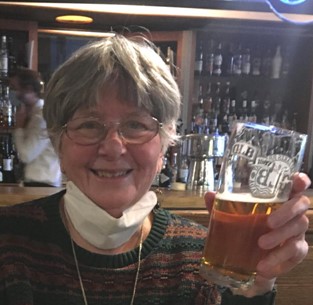First Soprano
Susan has spent most of her life in Toronto, except for “seven years in exile in the wilds of Suburban Montreal, and that ten-year sentence in Mississauga.” Now retired from the corporate world, she spends her time making miniature models, reading, quilting, and writing short crime fiction “as a way of fighting for social justice.” In 2017, she won the Arthur Ellis Award for Best Short Story from Crime Writers of Canada in 2017. Susan enjoys canoeing and kayaking and spending time at the cottage in summer. She has a daughter and three grandsons. She is recording secretary of the Echo board of directors.
Echo: You have been in choirs for most of your life—school, church and the Bicycle Choir—before you joined Echo in 2002.
SD: I’ve always belonged to a choir. I haven’t had music lessons but I have basic sight reading capacity. I’d love to be able to play an instrument. I spent years all my life dabbling with instruments and never realIy got proficient with any of them. I have a lovely guitar and a dulcimer that I’ve just had repaired. The dulcimer is quite easy to play and has a nice old, folky sound. During Covid, I got a ukelele and tried doing lessons online but I found I need live lessons from a real person.
The Bicycle Choir was started in the 1990s. We would sing while riding our bikes, but mostly we performed songs with “bicyclized” lyrics at environmental and political events, or just for fun. It lasted until around 2002, and lives on in songs and memories.
Echo: What does singing mean to you? What do you like most about Echo?
SD: Being able to make a joyful noise in harmony with others.I like the common mindset of Echo members: we sing meaningful songs about social justice and the environment, as well as folk music. We support each other in singing. The Zoom rehearsals during Covid have been a good interim measure, but I’m getting a little worn out after two years.I’m ready for a good session of singing together.
Echo: The other consistent activity in your life has been writing. After retirement, you began writing crime fiction and are now a published author. Tell us about your work as crime writer—why you chose this genre, what inspires you, etc.
SD: I have always had to write. I love reading traditional type crime stories (not so much the latest popular sub-genre — psychological thrillers). Crime fiction has a shape to it; at the end, there is a restoration of order. I use Canadian settings because this is where I live and I know the mindset. I couldn’t write from an American point of view, because I would be thinking differently. As for inspiration, I like writing short stories to submit to anthologies where I am given a theme and a deadline. I begin working with an idea, and it grows. I want a likable protagonist who tries to right a wrong—which isn’t necessarily about sleuthing.
Echo: In addition to Echo, you belong to Sisters in Crime. What is its purpose?
SD: Sisters in Crime is an American organization with Canadian chapters. It is not a writing group where members critique each other’s writing. We hold meetings with guest speakers and support women crime writers. You don’t have to be a woman to belong, but you have to support the concept of women crime writers. It was founded thirty years ago because there wasn’t enough recognition for women crime writers.
